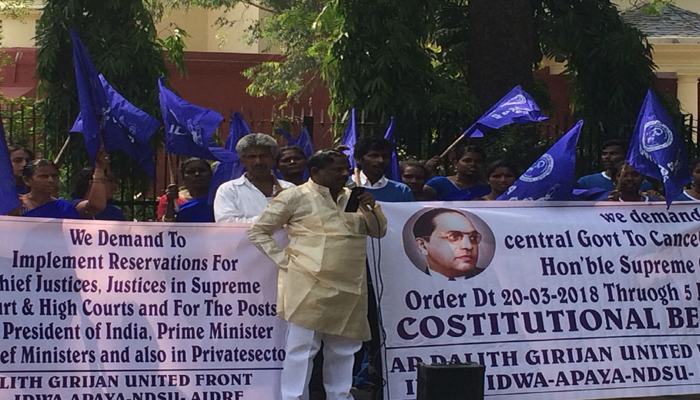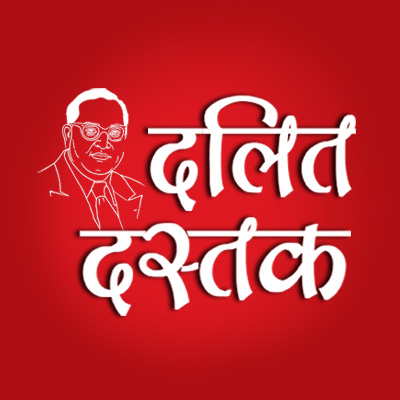 In the light of the peaceful protest and demonstrations against the Supreme Court’s decision to dilute certain key provisions to the Scheduled Castes and Scheduled Tribes (Prevention of Atrocities) Act 1989, on 1st May, International Labour Day, held at the Jantar Mantar, New Delhi and across 70 cities in India, one comes to realize what kind of days India is seeing and also signals towards what kind of dark times that are ahead for the marginalized communities in India.
In the light of the peaceful protest and demonstrations against the Supreme Court’s decision to dilute certain key provisions to the Scheduled Castes and Scheduled Tribes (Prevention of Atrocities) Act 1989, on 1st May, International Labour Day, held at the Jantar Mantar, New Delhi and across 70 cities in India, one comes to realize what kind of days India is seeing and also signals towards what kind of dark times that are ahead for the marginalized communities in India.
Violence –verbal, physical, sexual, mental, gendered, caste, communal and now ideologically systematic as well. You name it and our so-called secular country has all for you.
…and now it is even more systematic and blatant, so much so that you can identify with the State’s ideologies seeped into Brahmanism and the kind of world they want to create for us all and the kind of saffron world they emerge from.
The attempt of diluting the key provisions of Prevention of Atrocities Act 1989, suggests a clear motivation to disempower people from marginalized communities and systematically strategied methods to harass and punish them and this time more legitimately. Interestingly how I see it, this attack is not only a systematic attack on marginalized communities but it’s an attack towards the asserting voices of those people who have never had ‘access’ to spaces of ‘public discourse.’ But thanks to the man who thought of India differently, a man who dreamt of an equal and fair country for all, that there are tons of voices who have learnt to say their piece and with power.
Babasaheb Ambedkar symbolical assertion is rampant through many voices of Bhaujan communities – intellectuals, scholars, students, activists, academicians, musicians, film-makers, to name a few, although Bahujan’s communities most dedicated. Ambedkar followers are the people who may not have an agency to articulate the politics in your familiar language but they are they people whose lived experienced resonates for what Ambedkar stood for all along. The good thing about this fire is that owing to the limitations of a casteist India, the caravan still goes on, because that’s what perhaps is Ambedlar’s idea of ‘fraternity’.
“For a successful revolution it is not enough that there is discontent. What is required is a profound and thorough conviction of the justice, necessity and importance of political and social rights.”~ Dr. B. R. Ambedkar
Now the spirit of political and social rights is growing and this time it is undying and never seen before in Ambedkarite movement. So when one sees a culmination and participation of various coalition leaders, activists, SCs and STs Employees Associations, Trade Unions, Dalit and Adivasis Organizations, Human Rights Organizations, Women Organizations and community members in different parts of the country condemning this horrendous judicial impunity that the BJP government has been constantly playing, one cannot help but notice the ‘morality; behind such choices, but then who said, politics was meant to serve dirty purposes only.
With the force that fascist powers are hell bent on systematically corroborating towards legitimizing violence against the oppressed- Dalit, Adivasi, Muslims, women and children through cutting out on access and means of a dignified life, a cumulative anxiety is produced in the environment all around. An anxious reality of being the same man and woman that nature has produced but tagged with a superfluous idea of identity and the politics behind it. That very caste politics is the Bahujan assertion in India today. Action of this fiery assertion was seen when Scheduled Castes and Scheduled Tribes organizations held the protest on 1st May 2018 in 70 cities across the country to demand a reversal of the judgment that stopped immediate arrest of offenders under the SC-ST (Prevention of Atrocities) Act, a law meant for their protection.
National Campaign for Dalit Human Rights, Vidhthalai Chiruthaigal Katchi (Liberation Cheetahs’ Party, previously known as the Dalit Panthers of India), Dalit Rights Federation, CPM and the CPI took part in a protest in New Delhi.
Caste indeed is that blight that has stained the spiritual fabric of this country. With spirituality I don’t mean to associate with any kind of religious notion but the mere idea of freedom in a sound rational mind. But do we Indians have a sound mind? Let’s face it. Unless we don’t learn to think beyond caste, gender, communal and more such divisions all we are doing consciously and unconsciously is contributing to the part of infecting the casteist pool further.
Ramesh Nathan, convener of the National Coalition for Strengthening SC-ST PoA Act, said several review petitions had been filed in the Supreme Court seeking a reversal of the March 20 judgment. Below are the major 12 demands of the National Coalition against the repressive ruling and on the effective implementation of SCs and STs (PoA) Act 1989 as Amended 2015.
1. Government of India should ensure that either through Judicial or Parliamentary recourse the status quo of the SCs and STs (PoA) Act 1989 is restored to its original position as was before 20.03.2018 Judgment.
2. The SCs and STs (PoA) Act 1989 and the POA Amendment Act 2015 shall be included in the Ninth Schedule so that it may get some protection in the matter of judicial review.
3. Release of all the Dalit and Human Rights Defenders, activists, leaders, community members and employees arrested on 02nd April, during the “Bharat Bandh”. Immediate action should be taken against the people who were indulged in firing against the community.
4. Robustly, enforce and implement the amended SCs and STs (PoA) Act 1989 and Rules 1995 and in specific the rights of victims and witnesses as enshrined in the amended Act.
5. Establish mandatory Exclusive Special Courts as per Section 14 of the SCs and STs (PoA) Act 1989 in each district. These courts shall not take cases of any other legislation.
6. Take immediate measures to appoint Public Prosecutors of victim’s choice as per Rule 4 (5) of the SCs and STs (PoA) Rules 1995 for the speedy trial of the cases.
7. Conduct an open and transparent investigation under the Scheduled Castes and the Scheduled Tribes (Prevention of Atrocities) Amendment Act, 2015 and prosecute those Government and police officials under section 4 of the Act who are found to have aided and abetted criminals or found to have negligent in their responsibilities in implementing the provisions of the Act /plan and schemes.
8. Immediate notification or G.O to be issued to all the state governments to frame contingency plan in line with the contingency plan framed by the Government of Tamil Nadu and simultaneous framing of guidelines and schemes under the plan if any for the purposes of rehabilitation, employment, pension, strengthening socio economic conditions of the victims. Unless this is done the plan would be merely a piece paper.
9. National Human Rights Commissions, Scheduled Castes and Scheduled Tribe Commissions shall conduct open hearing all over the country on cases of atrocities and on the implementation of the SCs and STs (PoA) Act. The Commissions shall ask for the annual reports from the states and present the same before the Parliament.
10. The Parliament shall also debate during the sessions on the effective implementation of the PoA Act 1989. The Parliament shall constitute a National, State and district level Enforcement Authority for the effective implementation of the PoA Act 1989.
11. Ensure that the under developed Dalit and Adivasi habitats, habitats prone to atrocities, and habitats which are arsoned or damaged are provided with land, adequate housing, clean water and sanitation facilities and infrastructure facilities from the SCP/TsP and from the provisions of Contingency Plan.
12. Ensure externment of the persons likely to commit offence under the Act in any area included in ‘Scheduled Areas’ or ‘Tribal areas’ as referred to in Article 244 of the Constitution.
TIMES NOW, reported 23 hours back that the SC has dismissed Attorney General Venugopal’s plea seeking a stay on its verdict on SC and ST (PoA) Act and the arguments are set to continue on 16th May. It’s reporter also reports that SC clearly says, ‘the judgment has never said that FIR cannot be registered. That there is no bar on registration of any FIR if there is any offence that is made out. The only other thing that this judgment says that there should not be any unnecessary arrests and if there is any absurdity in allegations then there should be a preliminary enquiry. The interpretation and politicization of this SC/ ST Act judgment is something that the SC doesn’t accept. Further with respect to 2nd April ‘Bharat Bandh’ the court says that the agitation and deaths are not because of the court orders, it is because the failure of Law & Order situation.” The reporter further reported, “SC clearly said, ‘the society needs to ensure that Dalit atrocity stops. Social reform is necessary to stop Dalit atrocity.’
How typically Brahamanical? Speaking from hegemony to hegemony. Minus appropriate representation of the nature of crime and flamboyantly obliterating the ‘caste genesis’ and its oppressive history all over. Dropping words like ‘politicization’ ‘social reform’ and lack of ‘tolerance,’ may add to the exoticization of crime but doesn’t speak of the nature of crimes that marginalized communities face everyday in this country.
Presenting a perspective to you by India’s most formidable Bahujan journalist, Dilip C Mandal. This has been taken from Dilip C Mandal’s Facebook wall:
सुप्रीम कोर्ट से:
आज एससी, एसटी एक्ट पर सुप्रीम कोर्ट में हुई सुनवाई में मैं पूरे समय मौजूद रहा। हर तर्क को सुनने के बाद मेरी नजरिया यह है –
1. केंद्र सरकार मान चुकी है कि एससी-एसटी का वोट उसे नहीं मिलने वाला।
2. सरकार एससी-एसटी एक्ट को बचाने को लेकर किसी जल्दबाजी में नहीं है।
3. सरकारी वकील वेणुगोपाल ने स्टे मांगने पर बिल्कुल जोर नहीं दिया
4. जल्द तारीख भी नहीं मांगी।
5. दोनों जज गोयल और ललित सुस्ती में दिखे। कोई जल्दबाजी नहीं।
6. सरकार अपना कोर सवर्ण वोट बचा रही है। एससी-एसटी आता है तो आए। न आए तो भी चलेगा।
Now this flips the meaning of everything – politicization, tolerance, and social reform, access. What do you think?
- Jyotinisha
Jyotinisha is an independent Writer/Film-maker/Illustrator and Scholar based in Mumbai, India. She is an alumnus of the prestigious, Indian Institute of Mass Communication, New Delhi, and Film and Television Institute of India, Pune. Currently she is pursuing MA in Media and Cultural Studies at Tata Institute of Social Sciences, Mumbai and making a feature length documentary film on Dr. B. R Ambedkar

दलित दस्तक (Dalit Dastak) एक मासिक पत्रिका, YouTube चैनल, वेबसाइट, न्यूज ऐप और प्रकाशन संस्थान (Das Publication) है। दलित दस्तक साल 2012 से लगातार संचार के तमाम माध्यमों के जरिए हाशिये पर खड़े लोगों की आवाज उठा रहा है। इसके संपादक और प्रकाशक अशोक दास (Editor & Publisher Ashok Das) हैं, जो अमरीका के हार्वर्ड युनिवर्सिटी में वक्ता के तौर पर शामिल हो चुके हैं। दलित दस्तक पत्रिका इस लिंक से सब्सक्राइब कर सकते हैं। Bahujanbooks.com नाम की इस संस्था की अपनी वेबसाइट भी है, जहां से बहुजन साहित्य को ऑनलाइन बुकिंग कर घर मंगवाया जा सकता है। दलित-बहुजन समाज की खबरों के लिए दलित दस्तक को ट्विटर पर फॉलो करिए फेसबुक पेज को लाइक करिए। आपके पास भी समाज की कोई खबर है तो हमें ईमेल (dalitdastak@gmail.com) करिए।



